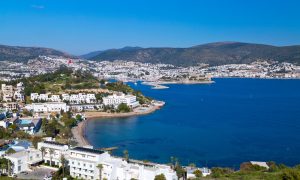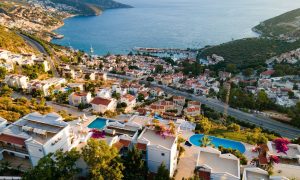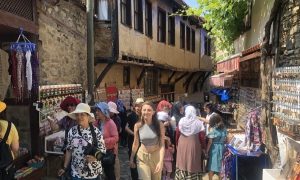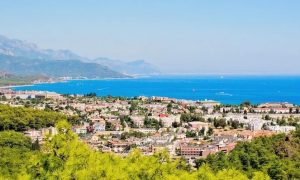As globalization accelerates, more and more people are choosing toimmigrants, Turkey, as a market with a unique geographic location, rich history and culture, and rapid growth, has become the destination of choice for many investors and immigrant families. However, like any immigration decision, theImmigration to TurkeyIt also has its pros and cons. This article will analyze in detailImmigration to TurkeyIt will help you to understand the advantages and disadvantages of living in Turkey and provide you with a basis for decision-making in your immigration program.
One,Turkish immigrantscompetitive edge
-
Cultural and historical diversity
Turkey is a place where East meets West, with a long history and a rich cultural heritage. When you immigrate to Turkey, you will not only be able to enjoy modern city life, but also experience the country's unique history and culture in depth. From the ancient ruins of Istanbul to the modern architecture of Ankara and the beautiful beaches of the Mediterranean coast, Turkey has a rich cultural landscape that is hard to match in any immigrant country.
Many immigrants choose Turkey because they are attracted by its historical sites, museums, religious culture, and traditional festivals. Turkey's multiculturalism and inclusiveness also makerecent immigrantsThe ability to integrate more easily into the local community.
-
Geographical location and climate
Strategically located at the border between Asia and Europe, Turkey is geographically favorable and serves as a bridge between the East and the West. As a country of immigrants, Turkey has a pleasant natural environment with four distinct seasons, especially the warm climate along the Mediterranean and Aegean coasts, which attracts a large number of immigrants seeking sunshine and a pleasant living environment. Turkey is undoubtedly an ideal place to live for immigrants who prefer a warm climate and outdoor life.
-
Real estate market and investment opportunities
Turkey's real estate market has performed strongly in recent years, with relatively high returns on property investment, especially in cities such as Istanbul and Antalya. By purchasing property, many migrants can realize asset appreciation and rental income. At the same time, the Turkish government's property purchase immigration policy provides convenience for foreign investors, with a relatively low minimum investment and the possibility of applying for Turkish citizenship or permanent residence after purchasing a property.
In addition, Turkey's manufacturing, energy, and technology sectors are growing rapidly, and these sectors also offer immigrants a wealth of employment and business investment opportunities.
-
Relatively low cost of living
Compared to many Western European and North American countries, the cost of living in Turkey is low. Both in terms of daily consumption and housing rent, Turkey is far less expensive than most European and American countries. This allows families immigrating to Turkey to enjoy a high quality of life while reducing their financial burden.
-
Progressive improvement of the health and education systems
Turkey's healthcare system is modernizing and there are many hospitals in the major cities with advanced equipment, many of which are also internationally accredited to provide a high standard of care. When you immigrate to Turkey, you will not only enjoy better medical care, but you will also have access to Turkey's public health benefits.
At the same time, Turkey's education system is gradually improving, especially international and private schools in the big cities, which are constantly upgrading in terms of teaching quality and providing better educational resources for children of expatriate families.
II. Challenges of Turkish migration
-
speech impediment

Although many of Turkey's young people speak English, the official language of Turkey is Turkish. For immigrants who do not know Turkish, daily and work communication may be difficult. Knowledge of Turkish is particularly important in business, government affairs and everyday life. Although more and more foreigners are choosing to live in Turkey, language remains a major obstacle for many.
-
Instability of the political and social environment
Turkey has experienced several political upheavals in recent years, and the stability of the social environment is a concern for many expatriates. Despite Turkey's gradual economic growth, fluctuations in the political situation, particularly government reforms and changes in relations with neighboring countries, can still affect the lives and work of expatriate residents. Expatriates need to keep an eye on political developments in Turkey and adjust their life and investment strategies in a timely manner.
-
Economic fluctuations and inflation

Despite its rapid economic growth, Turkey has a high inflation rate and a volatile currency. This poses certain challenges to the economic life of expatriates. For example, sharp fluctuations in the exchange rate may affect foreign exchange earnings, savings and investment returns. Inflation, on the other hand, may lead to a rising cost of living, especially in the prices of food and daily consumer goods.
-
Difficulty of social integration
Social customs and lifestyles in Turkey differ from those in Western countries, particularly in some traditional socio-cultural aspects. Migrants may find it difficult to integrate into the local society, especially those from non-Muslim countries, and may face greater challenges in religious and cultural adaptation. Although Turkey is a relatively tolerant country, it still takes some time and effort to establish deep social ties with the local population.
-
Complexity of administrative procedures
(go ahead and do it) without hesitatingTurkish immigration policyRelatively lenient, immigrants may still encounter some complex administrative procedures when going through the immigration process. The process of applying for permanent residence, work visas, tax registrations, etc. may require handling a large number of documents and following cumbersome processes. During this process, immigrants may feel troubled by language barriers and administrative inefficiencies.
III. Conclusion
Immigration to Turkeybrings with it a series of opportunities and challenges. While enjoying Turkey's low cost of living, multiculturalism, pleasant climate and investment opportunities, migrants also need to face challenges such as language barriers, unstable political and social environments, and economic fluctuations. Therefore, before making a decision to emigrate, it is advisable to fully assess your needs and goals, plan for the long term, and seek professional legal and immigration counseling services during the emigration process. Through careful preparation, you will be able to start a new chapter of your life in Turkey and enjoy the colorful life that this unique country offers.






